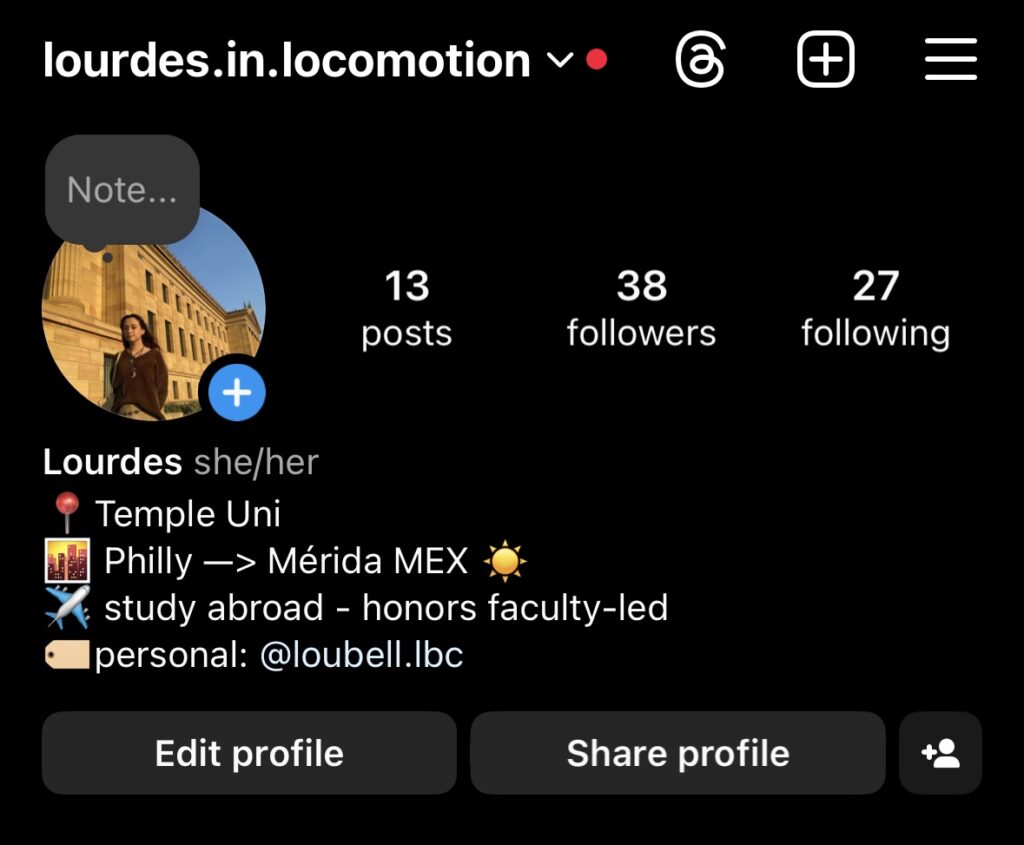Over the course of this trip, I journaled because I wanted to document everything and keep it in one place. I also created an Instagram account (@lourdes.in.locomotion if anyone would like to check it out) where I documented everything with pictures. The words I wrote in my journal and the photos I posted have become an artifact or souvenir for me. A way for me to remember my time spent abroad and share it with my family and friends.

When one of our guest lecturers, Francisco, came to talk to us about “Handcrafts, Souvenirs, and Ethnocommodities in Yucatan,” I realized that my idea of a souvenir needed to be expanded. This is why I have decided that my journal and my Instagram page are souvenirs; they are a way for me to remember. However, with Francisco’s lecture, I also realized I needed to re-evaluate how I think about remembrance and this trip. Is there a right way to remember my time here? If I share my travels from my perspective, am I really doing Yucatan and its people justice? Am I feeding my friends and family the full truth or just what I deem to be important? I noticed that I began to morph the narrative and censor my experience based on the audience.
I would report back to my parents about the beautiful beaches in Yucatan. I would send them pictures and videos of the waves and the food I ate there. )I’m from Colorado, so we have never had easy access to beaches) My parents LOVE tropical destinations and would travel all the time if they had the funds. So I knew I had to share these beach days with them more so than with others. My girlfriend was born and raised in a beach town, so although I sent some pictures, I didn’t feel as compelled to share them in the same way I did with my parents. (And on that note, I did not tell my parents about the nightlife.)
Similarly, now that I am back, I make a point to tell all my female friends about how safe the streets felt. This is not something I would share with my parents. In part because I didn’t want them to know I was walking around by myself (sorry Mom), but mostly because I didn’t want them to know the full truth about how unsafe North Philly can feel at times. I remember our discussions in IFSA about how friendly everyone would be to tourists, and at first, I doubted it. But this certainly proved true. Everyone was very kind, and I felt very safe, which is something I would make sure to share when talking with my female friends.
Then there are things that I remember just for me. “Me llama Maria” was a beautiful piece of art that I feel honored to have watched. Chisti Uicab is extremely talented, and I loved the way she presented femininity and a female experience in a man’s world. I noted that I journaled about her performance but didn’t tell anyone back home. For some reason, this play was something just for me, and I didn’t feel compelled to share. It’s not for lack of recollection because I loved this play. But does not telling people about it diminish its importance? Or would my retelling of the story from my perspective never do it justice?
The way I interact with people and share my stories really got me thinking. Who am I to share these narratives? And am I doing them justice? I thought a lot about Cannibal Tours, a documentary that really stuck with me throughout the trip. As we were all quite disgusted to see the behavior of these tourists, we have to be careful not to become a savior type of tourist. I feel like I tried to be very cautious not to think I was above or better than other tourists because of the life I tried to lead. When I took a picture with my Yaxunah host family, I asked before if we could take a picture together. At first, I felt it affirmed that my touristic tendencies were good-natured. I compared myself to the tourists on Cannibal Tours and felt proud not to bear a resemblance. But in reality, asking someone for consent to take a picture is the bare minimum. It shouldn’t secure my place as a “good tourist.” It shouldn’t validate any tourist to treat native communities with basic respect and dignity. In my opinion, people shouldn’t be praised for being a decent human, myself included. It should be required. As simple as it sounds, if I have learned anything about navigating my place as a tourist, it’s to treat people the way you want to be treated.
I think I have struggled a lot with how I remember my time abroad and how I act as a tourist. And whether or not my second-hand stories can ever do the experience justice. So when I remember this trip and share it with my family, I try to be cautious about how I tell these stories. I want to tell my family about the incredible people I met and do their stories justice. I want to talk about the culture and the languages and not diminish their worth. But above all else, I want people to know how incredibly grateful I am for this opportunity. A once-in-a-lifetime opportunity that I am so privileged to have experienced. It is something I will remember for the rest of my life.